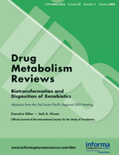
DRUG METABOLISM REVIEWS
Scope & Guideline
Exploring the intricacies of drug metabolism.
Introduction
Aims and Scopes
- Drug Metabolism Mechanisms:
Explores the biochemical processes and enzymatic pathways involved in the metabolism of drugs, including phase I and phase II reactions, and the role of cytochrome P450 enzymes. - Pharmacogenetics and Drug Interactions:
Investigates the genetic factors influencing drug metabolism and the implications of drug-drug and drug-gene interactions on therapeutic outcomes and adverse effects. - Transport Mechanisms in Drug Disposition:
Focuses on the role of drug transporters in pharmacokinetics, including absorption, distribution, and elimination processes, and their impact on drug efficacy and safety. - Toxicology and Hepatotoxicity:
Addresses the potential toxic effects of drugs and their metabolites, particularly focusing on hepatotoxicity and the mechanisms underlying drug-induced liver injury. - Biotransformation Research:
Covers advances in biotransformation studies, including novel methodologies for assessing drug metabolism and the development of predictive models for drug interactions. - Regulatory and Clinical Implications:
Discusses regulatory guidelines and clinical considerations related to drug metabolism, including in vitro and in vivo methodologies and their translation to clinical practice.
Trending and Emerging
- Pharmacogenomics and Personalized Medicine:
There is a notable increase in research exploring pharmacogenomics, emphasizing how genetic variations affect drug metabolism and response, thereby supporting the movement towards personalized medicine. - Drug Transporter Studies:
Emerging interest in the role of drug transporters in drug disposition and interactions is evident, highlighting their significance in pharmacokinetics and the blood-brain barrier. - Innovative Drug Delivery Systems:
Research on novel drug delivery systems, including nanocarriers and biopolymers, is trending, focusing on improving bioavailability and targeting specific sites, particularly in cancer therapy. - Impact of Gut Microbiota on Drug Metabolism:
An increasing number of studies are exploring how gut microbiota influences drug metabolism and pharmacokinetics, signifying a growing recognition of the microbiome's role in drug response. - Advanced In Vitro and In Vivo Models:
The development of sophisticated in vitro and in vivo models for studying drug metabolism and toxicity is on the rise, as researchers seek better predictive tools for clinical outcomes.
Declining or Waning
- Natural Product Drug Interactions:
Research on the pharmacokinetic interactions involving natural products has decreased, possibly due to a growing emphasis on synthetic drug development and biopharmaceuticals. - General Toxicogenomics:
While still relevant, the broad application of toxicogenomics in drug metabolism studies has seen a reduction in publications, as researchers increasingly focus on specific mechanisms and pathways. - Traditional Pharmacokinetics:
The traditional approaches to pharmacokinetics are being overshadowed by novel methodologies and advanced technologies, leading to fewer publications centered on classical pharmacokinetic principles. - Basic Mechanisms of Drug Resistance:
Studies focused solely on the basic mechanisms of drug resistance, without integration into broader clinical or translational contexts, have become less frequent as the field shifts towards targeted therapies and personalized medicine.
Similar Journals
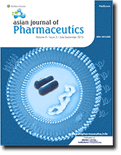
Asian Journal of Pharmaceutics
Illuminating the future of drug development and regulatory affairs.Asian Journal of Pharmaceutics, with ISSN 0973-8398 and E-ISSN 1998-409X, is a prominent publication in the field of pharmacology, toxicology, and pharmaceutics, published by the ASIAN JOURNAL PHARMACEUTICS. Since its inception in 2009, the journal has been committed to advancing the understanding of pharmaceutical sciences in Asia and beyond, encompassing innovative research, reviews, and perspectives from both established and emerging scholars. Despite its coverage discontinuation in Scopus, it continues to serve as a vital resource for researchers, professionals, and students aiming to explore the dynamic developments in drug formulation, delivery systems, and regulatory affairs. The journal's ranking in the 18th percentile within its category underscores its niche focus and relevance, making it an essential conduit for disseminating knowledge in the pharmaceutical domain. Open access options may enhance its reach and impact, allowing significant findings to be freely accessible to a global audience, thus fostering collaboration and knowledge exchange across borders.
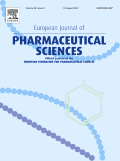
EUROPEAN JOURNAL OF PHARMACEUTICAL SCIENCES
Empowering Researchers to Transform Pharmaceutical PracticesThe European Journal of Pharmaceutical Sciences is a prestigious academic journal dedicated to advancing the field of pharmaceutical science. Published by Elsevier, the journal boasts an impressive impact factor and is categorized in the Q1 quartile for pharmaceutical science as of 2023, signifying its influence and reputation within the academic community. With a Scopus ranking of #20 out of 183 in the fields of pharmacology, toxicology, and pharmaceutics, the journal provides a vital platform for researchers and practitioners to disseminate innovative studies and groundbreaking research that push the boundaries of drug development and delivery. Based in the Netherlands and operating since 1993, the journal seeks to cover a broad scope of topics related to pharmaceutical sciences, encouraging rigorous evaluations and discussions that enhance the understanding and application of this critical field. The absence of open access underscores the commitment to maintaining high scholarly standards, while still offering avenues for libraries and institutions to provide access to cutting-edge research. As the journal converges towards its 2024 milestones, it continuously aims to foster a vibrant exchange of knowledge among its diverse readership, comprising committed researchers, professionals, and students.

European Journal of Pharmacology
Pioneering insights in pharmacology for a healthier tomorrow.The European Journal of Pharmacology, a prestigious publication by Elsevier, serves as a vital resource in the field of pharmacology, offering rich insights into drug development and therapeutic applications. Since its inception in 1967, this journal has evolved to encompass groundbreaking research, including pharmacokinetics, toxicology, and innovative pharmacological methodologies, making it an essential platform for researchers and professionals alike. With an impressive impact factor that places it in the Q1 category of pharmacological journals and a Scopus ranking of #49 out of 313, the journal is recognized in the 84th percentile within its category, solidifying its significance in the academic community. Although the journal is not open access, it continues to attract contributions from leading scientists worldwide, ensuring that cutting-edge findings are disseminated effectively. The European Journal of Pharmacology not only highlights advancements in drug discovery and clinical applications but also promotes interdisciplinary collaboration, ultimately contributing to the progress of healthcare globally.
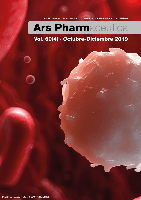
Ars Pharmaceutica
Innovating the intersection of science and the arts.Ars Pharmaceutica is a distinguished open-access journal published by UNIV GRANADA, EDITORIAL, that has been at the forefront of pharmaceutical sciences since its establishment. With ISSN 0004-2927 and E-ISSN 2340-9894, this journal aims to disseminate high-quality research in pharmacology, toxicology, and pharmaceutics, contributing to the advancement of the field. With a historical scope that spans from 1980 to 2017, it has played a pivotal role in shaping the discourse surrounding pharmaceutical science and its intersection with the arts and humanities. Although currently ranked within the 13th percentile in Scopus for Pharmaceutical Science and the 11th percentile for History and Philosophy of Science, Ars Pharmaceutica continues to uphold its commitment to academic excellence and innovation. By providing a platform for open-access research, it encourages collaboration and knowledge sharing among researchers, professionals, and students, thus enhancing the broader understanding of pharmaceutical developments and their societal implications.

DRUGS IN R&D
Shaping the future of pharmacology with impactful insights.DRUGS IN R&D is a premier open access journal dedicated to advancing the field of pharmacology and drug development. Published by Springer International Publishing AG, this journal has been a valuable resource for researchers and professionals since its inception in 1999, contributing critical insights into the pharmacological sciences. With an impressive Impact Factor reflecting its significance, DRUGS IN R&D ranks in the Q2 quartile for Pharmacology, according to 2023 metrics, and ranks #151 out of 313 in the field of pharmacology and toxicology on Scopus. This journal offers an open access format, ensuring high visibility and accessibility of research findings to a global audience, supporting the intrepid pursuit of knowledge in drug research and development. By facilitating comprehensive discussions and innovative research findings, DRUGS IN R&D plays a crucial role in shaping the future landscape of pharmacological studies and advancements.

Translational and Clinical Pharmacology
Elevating Standards in Translational ResearchTranslational and Clinical Pharmacology, published by KSCPT, is an esteemed journal that serves as a vital source of knowledge in the field of pharmacology, particularly focusing on the translational aspects that bridge laboratory research and clinical applications. Established in 2014, this journal aims to disseminate high-quality research and reviews pertaining to drug development, therapeutics, and the underlying mechanisms of action in the medical realm. With an ISSN of 2289-0882 and an E-ISSN of 2383-5427, it holds a significant position with a Q3 ranking in the pharmacology category as of 2023, emphasizing its role in advancing scientific understanding within this crucial discipline. While it operates as a traditional subscription-based journal, its output remains accessible through various academic platforms, contributing to the global discourse in pharmacology. Researchers, professionals, and students will find value in its insightful articles and comprehensive studies, underscoring the journal’s commitment to enhancing pharmacological knowledge and practice.
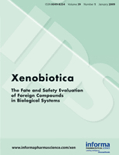
XENOBIOTICA
Exploring the Impact of Chemicals on Health and Environment.XENOBIOTICA is a premier journal in the field of pharmacology and toxicology, published by Taylor & Francis Ltd. With an ISSN of 0049-8254 and E-ISSN 1366-5928, this journal has been at the forefront of research since 1971, providing critical insights and advancements up until 2024. It is recognized for its rigorous peer-reviewed content, occupying a third quartile ranking across various categories including Biochemistry, Health, Toxicology, and Pharmacology as of 2023. The journal serves as a pivotal platform for disseminating innovative findings that address the impact of xenobiotics on health and the environment, making it an essential resource for researchers, professionals, and students engaged in these multidisciplinary fields. While it does not currently offer open access, it is widely respected for its contribution to science, evidenced by its Scopus rankings across different areas of study. The journal encourages submissions that push the boundaries of knowledge and transform our understanding of the effects of chemical substances on living organisms.
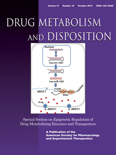
DRUG METABOLISM AND DISPOSITION
Fostering Excellence in Pharmacology and ToxicologyDrug Metabolism and Disposition is a premier journal published by the American Society for Pharmacology and Experimental Therapeutics, focusing on crucial advancements in the fields of pharmaceutical sciences and pharmacology. Since its inception in 1973, this esteemed journal has established itself as a leading platform for innovative research, earning a prestigious Q1 rating in both Pharmaceutical Science and Pharmacology categories as of 2023. With an impressive Scopus ranking of #52 out of 183 in Pharmaceutical Science and #105 out of 313 in Pharmacology, it occupies a vital place in an increasingly competitive academic landscape. Researchers, professionals, and students alike benefit from its rigorous peer-reviewed articles that delve into drug metabolism processes and their physiological implications, making it an indispensable resource for anyone aiming to advance their understanding of drug disposition and efficacy. This crucial journal contributes significantly to the ongoing dialogue in pharmacology and toxicology, providing insights that help shape future therapeutic strategies and regulatory policies.

DARU-Journal of Pharmaceutical Sciences
Advancing pharmaceutical knowledge for a healthier tomorrow.DARU-Journal of Pharmaceutical Sciences is a leading peer-reviewed journal published by SPRINGER INT PUBL AG that focuses on the dynamic and rapidly evolving fields of pharmaceutical sciences, including drug discovery, pharmacology, and toxicology. With an impressive Q2 ranking in both Drug Discovery and Miscellaneous Medicine categories for 2023, this journal stands out as a vital resource for researchers, professionals, and students alike, offering a platform for significant contributions to the scientific community. Covering a comprehensive scope from 2000 to 2024 and indexed by Scopus, the journal ranks within the top percentile in its field, with a ranking of #66/313 in Pharmacology and #34/157 in Drug Discovery, reaffirming its impact and relevance. The journal promotes open access to foster widespread dissemination of knowledge in pharmaceutical sciences, ultimately aiming to bridge the gap between research and clinical applications. For those looking to stay at the forefront of pharmaceutical innovation, DARU represents an invaluable connection to the latest studies and breakthrough findings.

ADMET and DMPK
Connecting researchers to shape the future of drug safety and efficacy.ADMET and DMPK is a premier open-access journal published by IAPC PUBLISHING since 2013, focusing on the rapidly evolving fields of ADMET (Absorption, Distribution, Metabolism, Excretion, and Toxicity) and DMPK (Drug Metabolism and Pharmacokinetics). Catering to researchers, professionals, and students in the realms of pharmacology, toxicology, and medicinal chemistry, this journal plays a crucial role in fostering innovation and collaboration within the interdisciplinary landscape of drug development. With an impressive Q1 ranking in Pharmacology, Toxicology and Pharmaceutics and ranking in the top percentiles across various categories such as Chemistry and Health, ADMET and DMPK provides a reputable platform for high-quality publications. Its global reach, complemented by its open-access model, ensures that valuable research is accessible to a wide audience. As we converge towards 2024, this journal remains dedicated to advancing knowledge and practices that shape the future of drug discovery and safety, making it an essential resource in the scientific community.